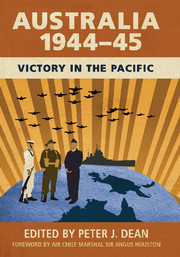Book contents
- Frontmatter
- Dedication
- Foreword
- Contents
- Maps and chart
- Figures and table
- Contributors
- Acknowledgements
- Abbreviations
- Military symbols on maps
- Introduction
- PART 1 STRATEGY
- PART 2 AUSTRALIA AT WAR
- PART 3 GREEN ARMOUR AND SPECIAL OPERATIONS
- 6 Learning and Adapting for Jungle Warfare, 1942–45: The Australian and British Indian Armies
- 7 Intelligence and Special Operations in the Southwest Pacific, 1942–45
- PART 4 THE NAVAL AND AIR WAR
- PART 5 THE NEW GUINEA CAMPAIGN
- PART 6 THE BORNEO CAMPAIGN
- Afterword: And Then Came Peace?
- Index
- References
7 - Intelligence and Special Operations in the Southwest Pacific, 1942–45
from PART 3 - GREEN ARMOUR AND SPECIAL OPERATIONS
Published online by Cambridge University Press: 05 December 2015
- Frontmatter
- Dedication
- Foreword
- Contents
- Maps and chart
- Figures and table
- Contributors
- Acknowledgements
- Abbreviations
- Military symbols on maps
- Introduction
- PART 1 STRATEGY
- PART 2 AUSTRALIA AT WAR
- PART 3 GREEN ARMOUR AND SPECIAL OPERATIONS
- 6 Learning and Adapting for Jungle Warfare, 1942–45: The Australian and British Indian Armies
- 7 Intelligence and Special Operations in the Southwest Pacific, 1942–45
- PART 4 THE NAVAL AND AIR WAR
- PART 5 THE NEW GUINEA CAMPAIGN
- PART 6 THE BORNEO CAMPAIGN
- Afterword: And Then Came Peace?
- Index
- References
Summary
When Gavin Long published the seventh volume of the official history Australia in the War of 1939–1945: The Final Campaigns in 1963, he ventured where few had gone before publicly by including an appendix on the Allied Intelligence Bureau – a secretive body responsible for some spectacular intelligence and special operations. Until then, few Australians knew much about the world of intelligence and special operations outside the closed circle of practitioners. But even then, while certain aspects of the special operations realm were revealed, significant elements of the Allied wartime intelligence apparatus remained largely unheralded. Sworn to secrecy, insiders understood that the secret of success lay in keeping successes secret. One of the ironies of this was that for decades afterwards historical accounts were incomplete and analysis of Allied victories deeply flawed. As a result, for generations few would really understand the wartime role played by the intelligence and special operations domains.
ULTRA TOP SECRET CODEBREAKING
More than a decade after publication of The Final Campaigns, and almost 30 years after the war's end, a retired Royal Air Force officer, Group Captain Frederick Winterbotham, published The Ultra Secret. This was a stunning revelation of how the German Enigma cipher machine functioned, how its codes were broken and how telegraphic traffic of the highest sensitivity was reported. The information was considered so sensitive it was described as being higher than simply ‘most secret’. It was ‘Ultra Top Secret’, or simply ‘Ultra’.
Possession of Ultra gave the English-speaking Allies an extraordinary insight into Axis planning and operations. Indeed, at the end of the war British Prime Minister Winston Churchill told King George VI at a meeting with Sir Stewart Menzies, who was head of MI6 (Britain's secret intelligence service), that ‘it was thanks to Ultra that we won the war’. Churchill may have been exaggerating, but Ultra did stave off several defeats early on from 1940 to 1942 and made a major contribution to the shortening of the war thereafter.
Ultra, in fact, was an ‘invaluable accessory’ in planning Allied strategic initiatives from 1942 to 1945. It is widely known now that Ultra was pivotal for the success of the Allied landings in Normandy in June 1944. Ultra was also crucial to Montgomery's successes against Rommel in North Africa in 1942.
Information
- Type
- Chapter
- Information
- Australia 1944–45Victory in the Pacific, pp. 145 - 168Publisher: Cambridge University PressPrint publication year: 2015
References
Accessibility standard: Unknown
Why this information is here
This section outlines the accessibility features of this content - including support for screen readers, full keyboard navigation and high-contrast display options. This may not be relevant for you.Accessibility Information
- 10
- Cited by
